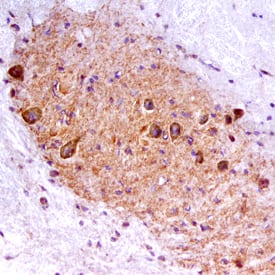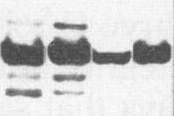Mouse GFR alpha -3/GDNF R alpha -3 Antibody Summary
Glu34-Arg379
Accession # AAB70931
Customers also Viewed
Applications
Please Note: Optimal dilutions should be determined by each laboratory for each application. General Protocols are available in the Technical Information section on our website.
Scientific Data
 View Larger
View Larger
GFR alpha ‑3/GDNF R alpha ‑3 in Mouse Embryo. GFRa‑3/GDNF Ra‑3 was detected in immersion fixed frozen sections of mouse embryo (15 d.p.c.) using 15 µg/mL Goat Anti-Mouse GFRa‑3/GDNF Ra‑3 Antigen Affinity-purified Polyclonal Antibody (Catalog # AF2645) overnight at 4 °C. Tissue was stained with the Anti-Goat HRP-DAB Cell & Tissue Staining Kit (brown; Catalog # CTS008) and counterstained with hematoxylin (blue). Specific labeling was localized to developing dorsal root ganglion and spinal cord. View our protocol for Chromogenic IHC Staining of Frozen Tissue Sections.
Preparation and Storage
- 12 months from date of receipt, -20 to -70 °C as supplied.
- 1 month, 2 to 8 °C under sterile conditions after reconstitution.
- 6 months, -20 to -70 °C under sterile conditions after reconstitution.
Background: GFR alpha-3/GDNF R alpha-3
Mouse glial cell line-derived neurotrophic factor (GDNF) family receptor alpha 3 (GFR alpha -3) is a member of the GDNF family of receptors. It is one of four known members, all of which contain three conserved cysteine repeats (1, 3, 4). It is synthesized as a 397 aa precursor, with a hydrophobic signal sequence of 28 aa, a 343 aa mature segment, and a propeptide segment of 26 aa that is removed in the mature protein. The mature globular membrane glycoprotein has an approximate molecular weight of 50 kDa (5), contains three potential N-linked glycosylation sites, and a hydrophobic stretch of residues at its COOH terminus that comprises a GPI linkage sequence (2, 3, 5). Mouse GFR alpha -3 shares 81% aa sequence identity with human GFR alpha -3. High-level expression of GFR alpha -3 is observed only during early stages of neurogenesis in the central nervous system and in developing and adult peripheral nerves, organs, and ganglia (2, 3, 5, 7). The expression and proportions of GFR alpha -3 are closely linked to those of the Ret receptor tyrosine kinase, particularly in the trigeminal ganglion, pituitary gland, thymus, lung, and duodenum (3). GFR alpha -3 associates with Ret to form the receptor complex for the GDNF family ligand artemin, which, in turn, activates the complex (1, 6, 7). The activated complex’s signal is required for the development and maintenance of superior cervical ganglion (SCG), specifically the rostral migration of SCG precursors between embryonic days 11.5 and 14.5, and the survival of SCG neurons after birth (8).
- Xinquan, W. et al. (2006) Structure 14:1083.
- Worby, C. et al. (1998) J. Biol. Chem. 273:3502.
- Naveilhan, P. et al. (1998) Proc. Natl. Acad. Sci. USA 95:1295.
- Nomoto, S. et al. (1998) Biochem. Biophys. Res. Commun. 244:849.
- Baloh, R. et al. (1998) Proc. Natl. Acad. Sci. USA 95:5801.
- Saarma, M. (2000) Eur. J. Biochem. 267:6968.
- Baloh, R. et al. (1998) Neuron 21:1291.
- Nishino, J et al. (1999) Neuron 23:725.
Product Datasheets
Citations for Mouse GFR alpha -3/GDNF R alpha -3 Antibody
R&D Systems personnel manually curate a database that contains references using R&D Systems products. The data collected includes not only links to publications in PubMed, but also provides information about sample types, species, and experimental conditions.
17
Citations: Showing 1 - 10
Filter your results:
Filter by:
-
Gdnf, Neurturin and Artemin Activate and Sensitize Bone Afferent Neurons and Contribute To Inflammatory Bone Pain
Authors: S Nencini, M Ringuet, DH Kim, C Greenhill, JJ Ivanusic
J. Neurosci., 2018-04-30;0(0):.
-
Cellular and molecular characterization of peripheral glia in the lung and other organs
Authors: Hall, S;Liu, S;Liang, I;Schulz, S;Ezran, C;Tan, M;Kuo, CS;
PloS one
Species: Mouse
Sample Types: Whole Tissue
Applications: Immunohistochemistry -
Expression of Glial Cell‐Derived Neurotrophic Factor Receptors Within Nucleus Ambiguus During Rat Development
Authors: Quinton Blount, Ignacio Hernandez‐Morato, Yalda Moayedi, Michael J. Pitman
The Laryngoscope
-
Genetic interplay between transcription factor Pou4f1/Brn3a and neurotrophin receptor Ret in retinal ganglion cell type specification
Authors: Vladimir Vladimirovich Muzyka, Tudor Constantin Badea
Neural Development
-
Galanin suppresses visceral afferent responses to noxious mechanical and inflammatory stimuli
Authors: Toni S. Taylor, Parvesh Konda, Sarah S. John, David C. Bulmer, James R. F. Hockley, Ewan St. John Smith
Physiological Reports
-
Cutaneous TRPV1+ Neurons Trigger Protective Innate Type 17 Anticipatory Immunity
Authors: Jonathan A. Cohen, Tara N. Edwards, Andrew W. Liu, Toshiro Hirai, Marsha Ritter Jones, Jianing Wu et al.
Cell
-
Neurog3-dependent pancreas dysgenesis causes ectopic pancreas in Hes1 mutant mice
Authors: Mette C. Jørgensen, Kristian H. de Lichtenberg, Caitlin A. Collin, Rasmus Klinck, Jeppe H. Ekberg, Maja S. Engelstoft et al.
Development
-
Novel combinatorial screening identifies neurotrophic factors for selective classes of motor neurons
Authors: S Schaller, D Buttigieg, A Alory, A Jacquier, M Barad, M Merchant, D Gentien, P de la Gran, G Haase
Proc. Natl. Acad. Sci. U.S.A, 2017-03-07;114(12):E2486-E2493.
Species: Mouse
Sample Types: Whole Cells, Whole Tissue
Applications: ICC, IHC, Neutralization, Western Blot -
Transient receptor potential cation channel subfamily V member 1 expressing corneal sensory neurons can be subdivided into at least three subpopulations
Authors: Abdulhakeem Alamri, Romke Bron, James A. Brock, Jason J. Ivanusic
Frontiers in Neuroanatomy
-
Peripheral injury of pelvic visceral sensory nerves alters GFRα (GDNF family receptor alpha) localization in sensory and autonomic pathways of the sacral spinal cord
Authors: Shelley L. Forrest, Sophie C. Payne, Janet R. Keast, Peregrine B. Osborne
Frontiers in Neuroanatomy
-
Characterization of axons expressing the artemin receptor in the female rat urinary bladder: A comparison with other major neuronal populations
Authors: Shelley L. Forrest, Peregrine B. Osborne, Janet R. Keast
Journal of Comparative Neurology
-
Artemin growth factor increases nicotinic cholinergic receptor subunit expression and activity in nociceptive sensory neurons.
Authors: Albers K, Zhang X, Diges C, Schwartz E, Yang C, Davis B, Gold M
Mol Pain, 2014-05-22;10(0):31.
Species: Mouse
Sample Types: Whole Tissue
Applications: IHC -
Characterization of bladder sensory neurons in the context of myelination, receptors for pain modulators, and acute responses to bladder inflammation
Authors: Shelley L. Forrest, Peregrine B. Osborne, Janet R. Keast
Frontiers in Neuroscience
-
Sciatic nerve injury in adult rats causes distinct changes in the central projections of sensory neurons expressing different glial cell line-derived neurotrophic factor family receptors
Authors: Janet R. Keast, Shelley L. Forrest, Peregrine B. Osborne
The Journal of Comparative Neurology
-
Vascular-derived artemin: a determinant of vascular sympathetic innervation?
Authors: Damon DH, Teriele JA, Marko SB
Am. J. Physiol. Heart Circ. Physiol., 2007-03-02;293(1):H266-73.
Species: Rat
Sample Types: Whole Cells
Applications: ICC -
Artemin overexpression in skin enhances expression of TRPV1 and TRPA1 in cutaneous sensory neurons and leads to behavioral sensitivity to heat and cold.
Authors: Elitt CM, McIlwrath SL, Lawson JJ, Malin SA, Molliver DC, Cornuet PK, Koerber HR, Davis BM, Albers KM
J. Neurosci., 2006-08-16;26(33):8578-87.
Species: Mouse
Sample Types: Whole Tissue
Applications: IHC -
Glial cell line-derived neurotrophic factor family members sensitize nociceptors in vitro and produce thermal hyperalgesia in vivo.
Authors: Malin SA, Molliver DC, Koerber HR, Cornuet P, Frye R, Albers KM, Davis BM
J. Neurosci., 2006-08-16;26(33):8588-99.
Species: Mouse
Sample Types: Whole Cells, Whole Tissue
Applications: ICC, IHC-Fr
FAQs
No product specific FAQs exist for this product, however you may
View all Antibody FAQsReviews for Mouse GFR alpha -3/GDNF R alpha -3 Antibody
Average Rating: 5 (Based on 2 Reviews)
Have you used Mouse GFR alpha -3/GDNF R alpha -3 Antibody?
Submit a review and receive an Amazon gift card.
$25/€18/£15/$25CAN/¥75 Yuan/¥2500 Yen for a review with an image
$10/€7/£6/$10 CAD/¥70 Yuan/¥1110 Yen for a review without an image
Filter by:

















